Enab Baladi’s Investigation Team
“Do not return”
Major General Issam Zahreddine’s advice to the Syrian refugees not to return to Syria was not senseless. Such advice conveyed a secret plan concocted by the Syrian regime and its security apparatus to be spread among Syrians and implemented indirectly through a number of resolutions and laws. Sure enough to quote Zahreddine: “I am warning you, do not return”.
One year after Zahreddine’s advice, who was killed in September, 2017, al-Assad forces regained most of the areas beyond its control, from Eastern Ghouta, Eastern Qalamoun and Homs Northern countryside to the provinces of Daraa and Quneitra. Russia has begun to promote the return of refugees as a cornerstone of its political work, represented by the Constitutional Commission established in Sochi.
Official statements by the Syrian regime supported the Russian calls. Syrian Foreign Minister Walid al-Muallem stressed the necessity of paving the way for the Syrian refugees’ return, while deputy foreign minister Faisal Mekdad promised that the Syrian government “will facilitate the return by all means in cooperation with the United Nations, which insists, as we are, that the Syrian refugees come back home voluntarily and with dignity”.
Syrian Local Administration Minister and Head of the Coordination Agency for the Return of Displaced Syrians, Hussein Makhlouf said that, “the return of the Syrian refugees to their homeland is a priority for the government, and the doors are open to all Syrians to return home safely”.
But in reality, the measures taken by the Syrian regime reinforce the idea of a “homogenous society” that Bashar al-Assad has recently spoke about, away from the displaced community in regional countries and Europe, which has more than five million refugees, according to the UNHCR.
In addition to poor living standards and the weak economy in Syria, the security file appears to be the biggest obstacle. The Russian solutions to Syrians wanted by the security branches are apparently not effective, as evidenced by the arrest campaigns against dozens of young people in the areas that have been settled and became under the Syrian regime’s control.
Travel approval … Jobs only for those who performed compulsory military service
On September 2, the Immigration and Passports Department in Syria imposed a travel permit on the young people wishing to leave the country. The permits were meant to be extracted from the different military entrance processing stations located in the provinces.
Al-Watan newspaper quoted a source in the Department of Immigration and Passports as saying that the decision was issued by the Ministry of Defence and requires a travel authorization from the military entrance processing station for anyone aged between 17 and 42 when leaving the country.
According to the source, the decision was implemented immediately without any announcement or prior notice. This caused confusion at the border posts and at the airport. Thus, passengers were not informed in advance and hundreds were banned from travelling, and thus forced to lose the plane tickets costs.
The newspaper pointed out that the decision was dictated by a decree issued in 2007, but its application was agreed between the Ministry of Defence and the Ministry of the Interior. The arrangement consisted of asking for travel approval when issuing passports only. However, new instructions were imposed, following an article in the aforementioned decree, without taking into account previous agreements which were “intended to facilitate the travelling process for citizens”.
Hours after implementing the travel approval procedure, the Syrian regime resorted to the decision of making the military service a compulsory condition for public sector job applications.
Al-Watan newspaper stated that the Presidency of the Council of Ministers asked public bodies to include the requirement to perform compulsory military service for male applicants for any contest to fill a vacancy or contracting announced by Syrian ministries. On the other hand, the applicant can prove that he has already performed military service, or that he is exempted when submitting his application.
The newspaper said that the president of the Council of Ministers asked the ministries to direct the concerned parties and ministerial bodies to include the requirement to perform military service.
The Presidency of the Council of Ministers has not officially announced the decision to date, which is considered a landmark event and which negatively affects a large number of university and institutes’ graduates as well as ordinary people applying for jobs in governmental departments.
The decision to include the military service provision for job applicants prevents all young men who have remained in Syria from obtaining jobs in governmental departments, especially university graduates and those with academic qualifications.
Turning on settlements
Despite the near end of military operations on the ground, military recruitment campaigns by the regime are still going on, mainly targeting young people aged between 18 and 42, not only in areas under the regime’s control, but also in newly dominated regions under reconciliation and settlement agreements with the opposition factions.
Eastern Ghouta, Daraa and Homs Northern Countryside entered into settlement agreements with the Syrian regime, including providing a six-month time frame for those who have not performed military service to join the military posts. However, the terms agreed upon were not implemented, and several campaigns were launched targeting all the young men who remained in their areas and headed to Northern Syria.
In Duma, Eastern Ghouta, local sources told Enab Baladi that a ZiL military vehicle stops in the streets of the city from time to time and military personnel would start a whimsical campaign of arrests against youngsters. The arrests are justified by the argument that the young men held in custody will be transferred to forced labour, on the one hand, and for military service on the other.
The situation in Duma is reduplicated in Daraa province, where arrests are being made against young men. The charges range from previously dealing with ISIS to refusing to perform military service.
In Homs Northern Countryside, the Syrian regime arrested the reconciliation figures who had the most prominent role in restoring al-Assad’s authority over the region under a Russian-sponsored deal last May.
On September 2, Enab Baladi’s correspondent reported that the arrest of Sheikh Abdul Rahman al-Dhehik, Sheikh Ahmed Suweis, and Sheikh Yassin Suweis (Kasum) as well as Jihad Latouf came suddenly. All these figures were former members of the Sharia Courts of the opposition factions, and also worked on advisory missions to al-Tawhid Brigade.
On August 18, the Syrian Air Force Intelligence branch in Homs summoned 23 dissidents from the northern countryside, after sending them messages through al-Tawhid Brigade.
At the time, Enab Balabi’s reporter stated that the dissidents, most of whom are from Talbessa city, were transferred by the Air Force Intelligence branch in Homs to branch no. 293 in Damascus, following their submission to the communiqué.
In addition, the Syrian regime has worked on attracting a large segment of the region’s young men to join its forces through “recruitment contracts”. In the latest news, it transferred hundreds of them to the vicinity of Idlib Governorate to participate in the upcoming military operation.
In the same context, a number of state employees and teachers in all the Syrian governorates have been withdrawn in the previous years to serve in the reserve military service despite their old ages.
The Director of the Public Recruitment in Syria, Major General Sami Mahalla, attributed last year’s issue of withdrawing young men to the reserve military service to the “reinforcement of the armed forces with manpower at the age of 18-42 years, to secure the rudiments of victory, mainly the men recruited to join them as the evil forces have collected more than 360 thousand combatants in Syria,” as he put it
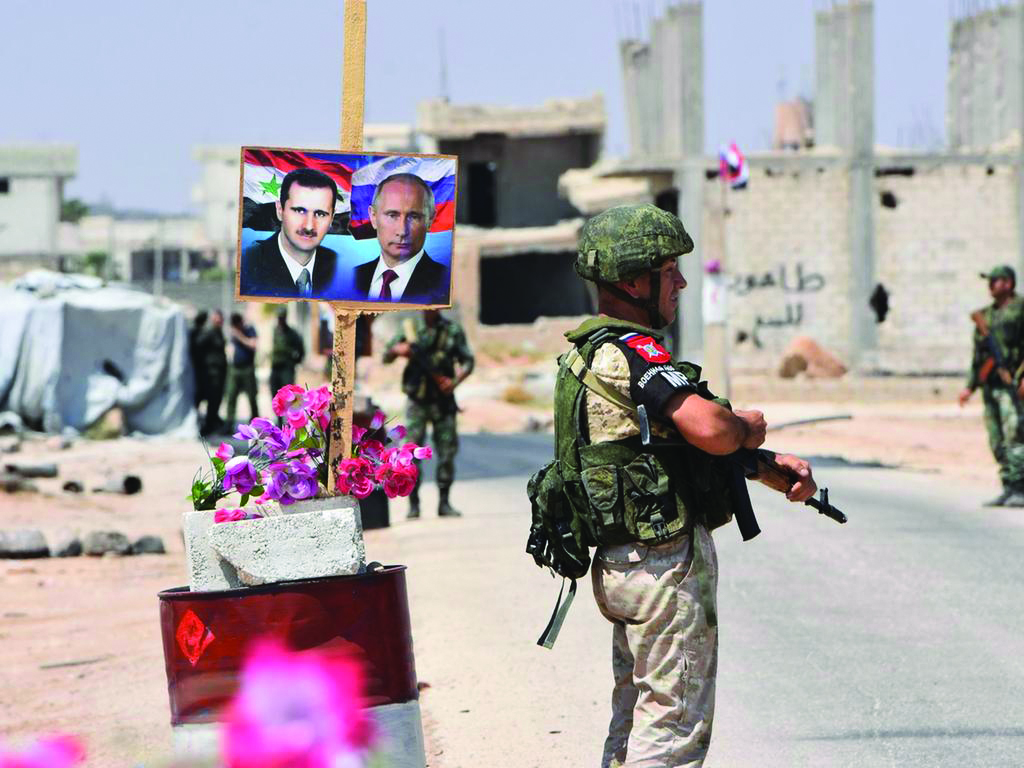
Soldiers of Russian forces standing near posters of the Syrian regime’s president Bashar al-Assad and Russian President Vladimir Putin in the east of Idlib Governorate – 20 August 2018 (Getty)
Law No. 10
Law No. 10 is among the measures the Syrian regime has recently taken as part of the steps that would put an end to the refugees’ last hope to return to Syria. It was issued by the Syrian regime’s President, Bashar al-Assad on April 2, and it stipulates the “creation of one or more regulatory area as part of the general organizational part of the administrative units.”
The law requires house owners to provide proof of the property ownership within 30 days; otherwise they will lose ownership of these properties. The state will confiscate them, and it has the right to give their ownership for those it deems appropriate.
The decision came at a time when more than half of the Syrians fled their homes, according to UN statistics, which means the government may take advantage of their absence and loss of their property papers to acquire their properties in ways it considers “legal.”
The citizens fear that the law enforcement mechanisms will not take into account their circumstances, in terms of notifying them about the new regulations, and the short deadline allowed to prove their property ownership, or the possibility of this at the first place in light of the inclusion of hundreds of thousands of them on lists of wanted people by the Syrian regime and their deprivation of running dealings in the state institutions.
In May this year, Human Rights Watch warned that the application of Law No. 10 would lead to “forced eviction” of citizens who are unable to prove their property ownership.
In a report published on its official website, the organization considered that the law affects property rights and does not provide trial procedures or compensation. Hence, the law may reach the level of “forced eviction” of property owners and the confiscation of the properties who have no recognized ownership rights.
The organization found out that the law does not meet the standards of the International Covenant on Economic, Social and Cultural Rights, which includes “genuine consultation with the affected persons, and adequate and predictable notice to all affected individuals before the scheduled date of eviction.”
The organization mentioned that the 30-day deadline period does not correspond to the period stipulated by the law, pointing out that the opponents’ inability to “submit their demands means the absence of a real consultation.”
It also considered that the new law constitutes “a major obstacle to the return of refugees,” and called on the Syrian regime’s allies, such as Iran and Russia, to encourage the regime to repeal such problematic laws.
According to the organization, the law provides an official framework to transfer the land ownership to the Syrian regime, which has the power to grant reconstruction and development contracts for companies or investors and compensate them in the form of quotas in regulatory areas.
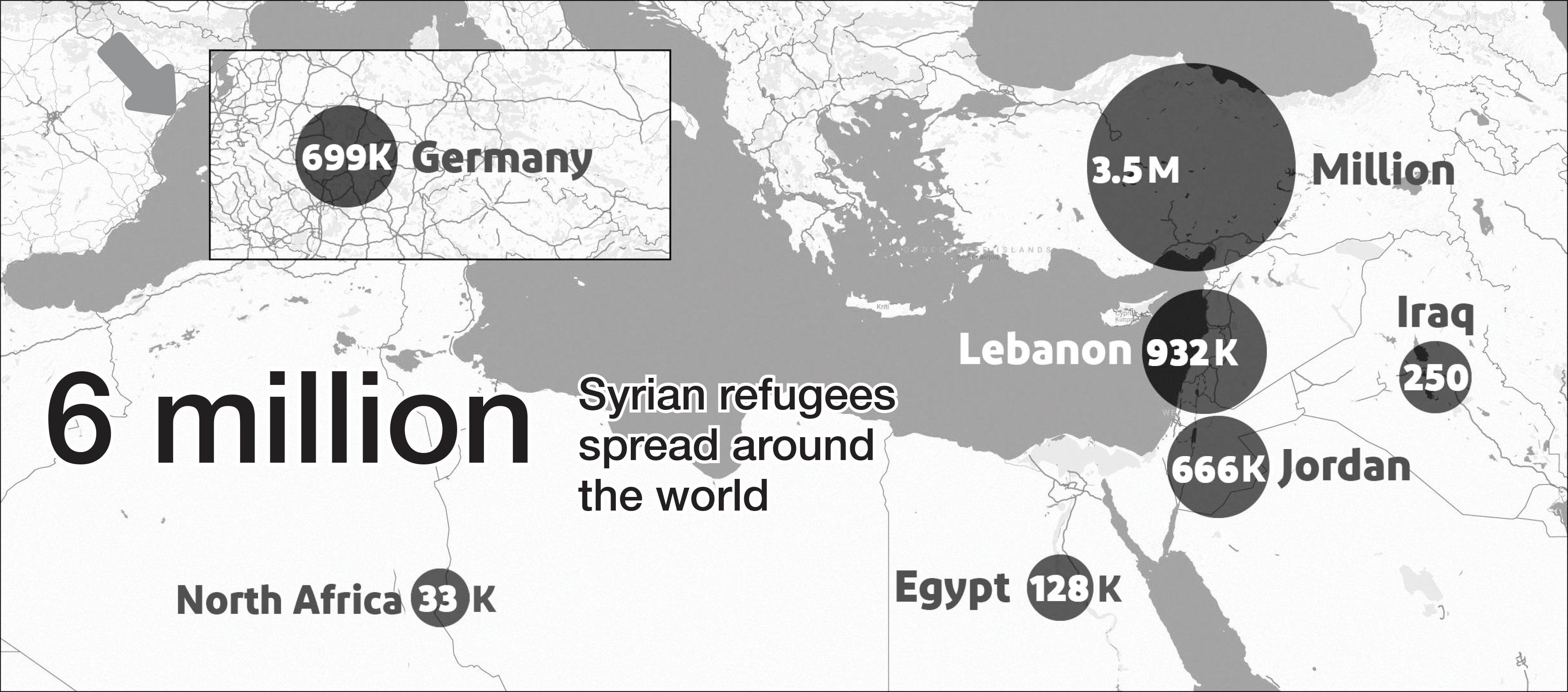
Source: UNHCR, DW
Map showing the spread of Syrian refugees in neighbouring countries and Europe 2018 (United Nations)
What is Russia’s plan for refugee repatriation?
The Russian Defence Ministry announced the development of a plan to repatriate Syrian refugees on July 18, which is the first step of its kind since the start of the wave of Syrian refugees in 2011.
Russia initiated its aforementioned plan by attracting international support when it sent requests to 45 countries to obtain accurate data and figures on the Syrian refugees living there, pointing out that the preliminary figures it obtained were initially consistent with the statistics of the UN Refugee Agency.
Afterwards, Moscow announced the establishment of 76 centres for the shelter, reception, and distribution of refugees wishing to return to Syria, in cooperation with the government of the Syrian regime, to accommodate more than 336 thousand Syrian refugees, distributed as follows: 73 thousand refugees in Rif Dimashq Governorate, 134 thousand refugees in Aleppo, 64 thousand refugees in Homs, 10 thousand refugees in Hama, 45 thousand refugees in Deir ez-Zor and 9 thousand refugees in Eastern Qalamoun.
The tasks of the sheltering centres are focused on monitoring the return of refugees from foreign countries to Syria, providing the necessary assistance to them, then sorting them out in their permanent areas of residence, and keeping the homeless in the sheltering centres.
As part of coordination for these centres, the Russian Ministry of Defence established an office in Moscow in cooperation with its Ministry of Foreign Affairs, which would be tasked to coordinate the work of the sheltering centres and implement the planned activities.
However, the Russian efforts to repatriate refugees have formed mystery about being a priority alongside the reconstruction plan. The Syrian regime and its ally Russia have linked the return of Syrian refugees to the reconstruction plan and political process matters in the region.
Moscow has decided to bear the heaviest matter in the Syrian crisis, after bearing the burden of managing the military and political matters in Syria.
Russia has taken advantage of every political or international opportunity to promote its project on the international scene, as Iran has been doing in light of what it says a strive for achieving peace in the region.
Disobeying the Russians…
Why does the regime violate its ally’s plan?
Some of the measures and decisions the Syrian regime has been taking inside the Syrian territories under its control may form an obstacle in front of the Russian steps adopted in its dual process of returning Syrian refugees and reconstructing the region.
Despite the Russians’ efforts to overtly advocate this file, many of the new decisions the regime has recently issued came against the Russian expectations, especially the issue of compulsory service as it is the biggest obstacle chasing young Syrians, and forcing them to travel abroad.
The Syrian regime closed the last doors to young people wishing to remain in Syria after the decision to cancel the additional session for university students except for the fourth year, which constituted a new incentive for young people to leave and emigrate abroad. However, this decision was followed another decision preventing them from leaving the country.
These measures and decisions, along with the lack of clear Russian assurances may make many refugees think carefully about the option of return and whether it is right or not.
The member of the Cairo Platform Firas al-Khalidi said in a statement to Enab Baladi that the refugees who are being pursued by the Syrian regime will not trust the Russian plan that has not provided them with adequate guarantees under which they may turn from humanitarian refugees into political refugees.
He said: “There are no international guarantees for them or even a UN aid project that will help them stay”. He added: “With all these guarantees and the presence of Iranian terrorist militias, it is dangerous and difficult, even for those who are forced to do so, to return to Syria.”
In the Iranian interest
Despite the Iranian political participation in the marketing of the Russian plan, it has a great interest in the non-return of many “untamed” refugees who cannot fit the Iranian policy inside Syria, according to the opposition journalist, Wael al-Khalidi.
“The actions of the Syrian regime have started since Putin decided to bring aid to al-Ghouta last year and Iran has refused to do so,” al-Khalidi said in a statement to Enab Baladi.
Al-Khalidi said that “Iran is controlling the administrative decision in Damascus, while Russia is controlling the so-called legitimacy, namely the head of power, Bashar al-Assad.”
Iran is seeking through some of the decisions taken by the regime to counter the operations and attempts of popular return and therefore the violation of the Russian project for two reasons, according to al-Khalidi. “The first is to prevent people from returning because their return contradicts all the operations of change, displacement, and control performed by Iran and its affiliated militias.”
The second reason is “to disrupt the Russian project and to show that Iran still exists. Even though Russia has the upper hand in Syria, Iran has an upper hand on decisions on the ground, too.”
Al-Khalidi believes that the recent decisions of the Syrian regime reflect an Iranian point of view, albeit through the regime’s government, in response to the Russians and “consecration of the Iranian occupation project.”
The Syrian opposition journalist pointed out that Iran and “since the start of negotiations in Syria, has flouted all Russian guarantees, as happened in the areas of reconciliation.”
International warnings: Syria “is not safe”
Despite the international mobilization that Russia sought to gain by announcing a vague plan for the repatriation of Syrian refugees, the international response appeared to be somewhat weak for such a serious initiative which is the first of its kind since the wave of Syrian asylum began in 2011.
The fact that Moscow is giving the international community a heavenly relief, and perhaps an opportunity to get rid of the burden of refugees that has imposed heavy burdens on it, has not convinced many countries which realized that the extent of Russian blackmail in return for refugees repartition will be bigger than their burden.
The international community is well aware that Russia’s eyes will be directed towards funds to support the Syrian refugees returning to their country. It will also receive international gains for outstanding political issues through the use of the refugee card to pressure Europe to participate in the reconstruction of Syria, which is always associated with the political transition of the Syrian regime.
France … Conditions of return have not been realized
France expressed its strong opposition to the return of the Syrian refugees to their country, declaring that “the conditions for the return of refugees to Syria have not been achieved yet due to al-Assad’s ill treatment of those who returned to their homes and the possible attack on the territory of the opposition in northern Syria.”
Paris’ warnings were made by the French Foreign Ministry spokeswoman Agnes von der Mol on August 23, who said that “considering the return of Syrian refugees is a deceptive issue under the current circumstances.”
The French spokeswoman quoted presidential law No. 10, and said that it denies refugees and internally displaced persons their property, pointing to instability in Syria, and cases of arbitrary detention and recruitment of Syrians returning from Lebanon.
France’s ambassador to the Security Council, Francois Delattre, said his country would not yield to the Russian calls to participate in the reconstruction of Syria without achieving serious political transition of government in Syria. “Political transition is a prerequisite for stability in Syria,” he said.
Germany requires political transition
Germany announced its stance on the return of refugees during a summit between Russian President Vladimir Putin and German Chancellor Angela Merkel in mid-August, when the latter linked the return of refugees to the political transition of the Syrian regime.
Merkel said Germany wanted to start the political process in Syria so that at least part of the millions of people displaced by the war could return to their homes. She said during a press conference that her country would ask Russia to pressure Damascus so as not to hinder the return of refugees to Syria.
She added: “I talked about our concern about Syrian Decree No. 10. If people do not claim their property until a certain time, they will lose it, and this is very bad news for all those who want to return someday to Syria.”
Unified statement by the European Union
The European Union issued a joint statement on behalf of its member states, where it said that it believed that the situation in Syria was not yet appropriate for the return of the Syrian refugees.
The statement, issued on 27 August, said that Syria is still suffering from the scourge of war and is still not safe for the return of refugees, in response to the Russian plan aimed at returning Syrians abroad.
However, Reuters quoted European Union officials as saying that European countries were sticking to their position not to provide funds for the reconstruction of Syria “as long as President Bashar al-Assad does not allow the opposition to take part in power.”
The European Union is scheduled to hold a meeting at the level of foreign ministers in Austria soon, to discuss the issue of the return of Syrian refugees and to respond clearly to the Russian plan.

A member of the Lebanese General Security with Syrian children refugees waiting for the return of buses to Syria – Lebanon on April 18, 2018 (Reuters)
Poll: Recent regime decisions “eliminate the hope of return”
Enab Baladi newspaper conducted a survey on its website and Facebook page to find out the views of its readers about the decisions and the recent steps taken by the regime and its role in facilitating or obstructing the return of Syrian refugees.
Enab Baladi asked the following question: “How do you consider the procedures and laws that are being enacted by the Syrian regime under official calls for the return of refugees?”
69% of the 550 respondents said that the regime’s procedures “eliminate the hope of return,” while 16% of the participants said they encourage the return of the refugees. 15% of the participants did not resolve their position and voted “I do not know.”
A group of Facebook users commented on the Facebook poll. The majority considered that the procedures and laws taken by the regime are not in the interest of those who wish to return to Syria.
Facebook user Alaa Abu Obeida said that “the regime’s procedures do not actually matter. All the countries in the world will try to get rid of the refugees and send them back to their country. All the regimes in the world have no problem with Bashar al-Assad and consider him the legitimate ruler in Syria, and did not sever their relationship with him.”
if you think the article contain wrong information or you have additional details Send Correction
النسخة العربية من المقال
-
Follow us :











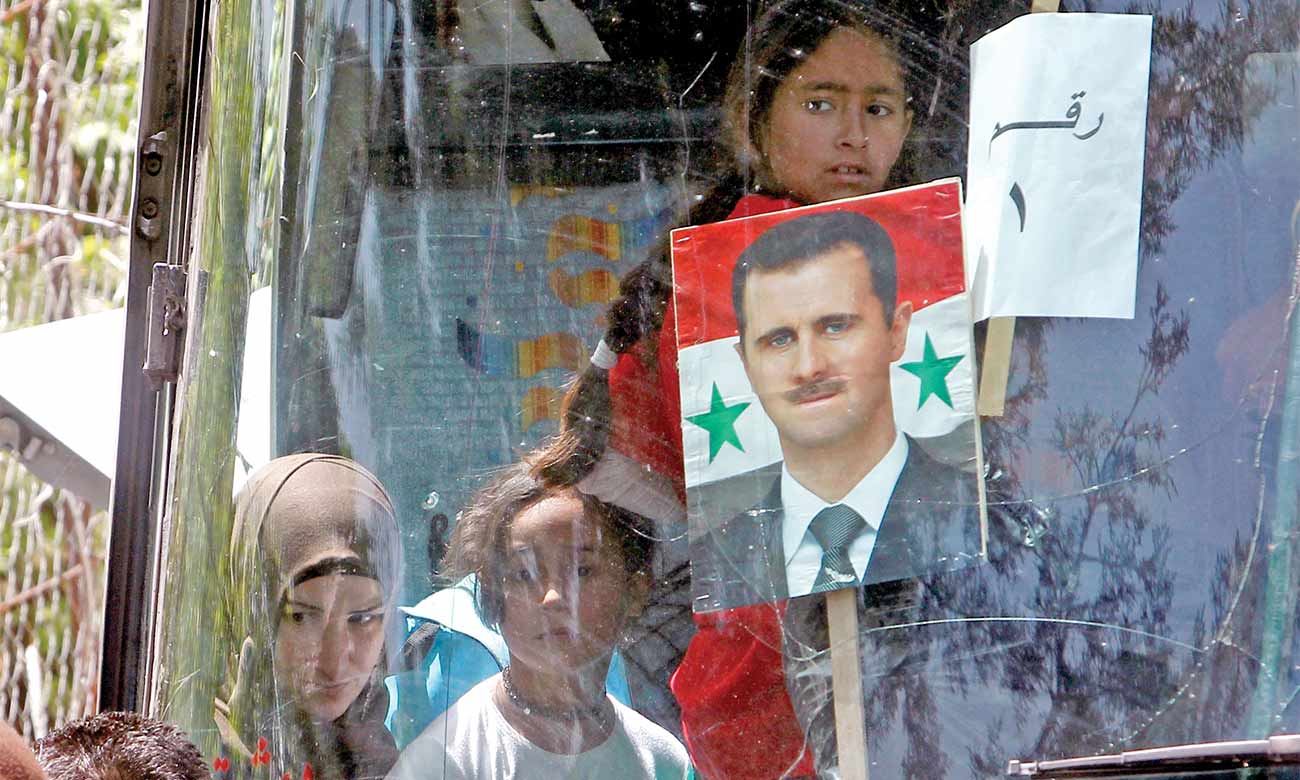
 Syrian President Bashar al-Assad's photo on a bus taking Syrian refugees back to Syria - Lebanon on April 18, 2018 (Reuters)
Syrian President Bashar al-Assad's photo on a bus taking Syrian refugees back to Syria - Lebanon on April 18, 2018 (Reuters)





 A
A
A
A
A
A



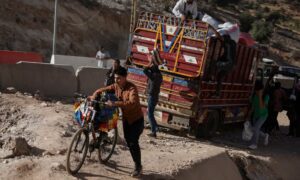

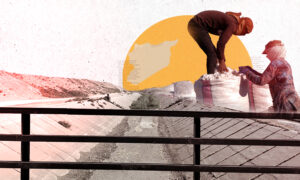
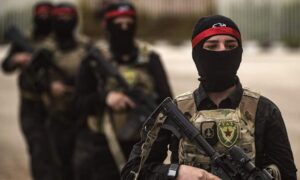
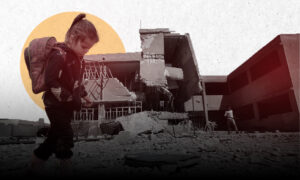
 More In-Depth
More In-Depth